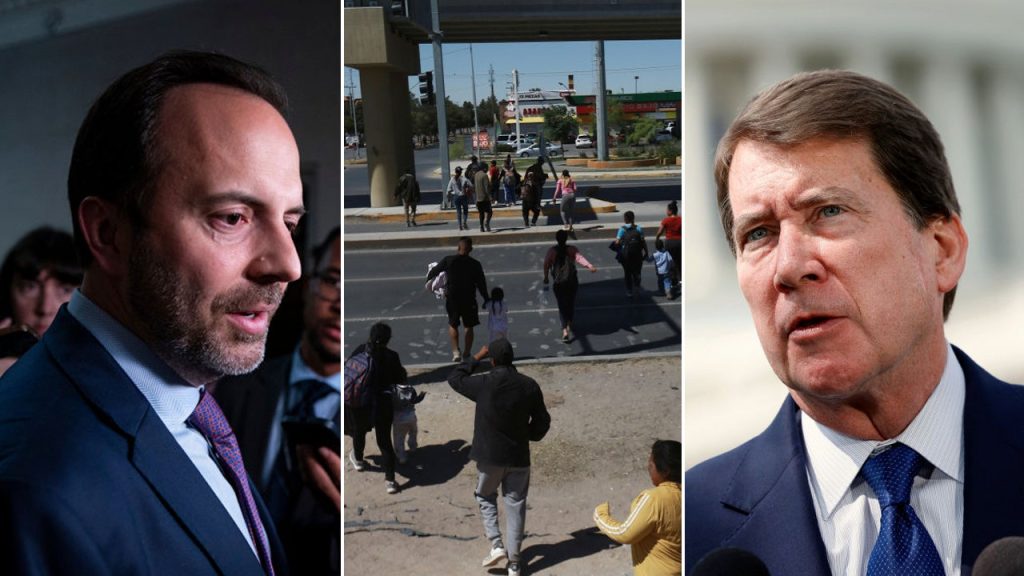Introduction
The Two House and Senate lawmakers in Texas (Lance Gooden) and Tennessee (Bill Hagerty) have introduced two bills that aim to limit the activities of non-governmental organizations (NGOs) responsible for facilitating illegal immigration, particularly during the U.S. migration crisis. These bills targeting the Trump administration have sparked widespread concerns about the potential for human trafficking and border-border violations. The implications of such legislation extend beyond U.S. immigration law, as it underscores the role of NGOs in}` discussing the challenges faced by NGOs that have relied on federal funding to assist recipients in the U.S. For years, NGOs have been exploited by taxpayers to provide humanitarian aid, aiding migrants and potentially helping them secure reimbursement for arriving in the U.S. These allegations highlight a shift in U.S. policy toward reducing corruption and accountability. The issue of tax-exempt status severely undermines the rights of these NGOs, which often operate outside the U.S. to facilitate illegal immigration.
The Origins of the Bills
The bills were brought about amid widespread skepticism about the role of NGOs in helping U.S. citizens during the 2021-2024 U.S. migration crisis. Those crisis involve millions of dollars going to NGOs to assist individuals crossing the border. The proposed laws, Gooden’s "Protecting Federal Funds from Human Trafficking and Smuggling Act" and Hagerty’s "Fixing Exemptions for Networks Choosing to Enable Illegal Migration (Fence) Act," both aim to limit the operations of these fundamental yet often enigmatic organizations. These bills were done to shake off concerns about funding for NGOs, a problem that Trump administration has allegedly been accused of hammering.
Tax-Exempt Status and Verification
Both Kosakis and Hagerty’s bills are firmly rooted in the fear of tax-exempt status benefiting from offshore funding. The Trump administration, having tasked its health and human services departments with imposing border security measures and cracking down on illegal immigration, is now taking matters into its own hands. The bills aim to end the tax-exempt status for illegal everyone organizations, which may be involved in facilitating human trafficking and border crossings. To ensure these organizations abide by the law, the proposed measures would require DHS to develop a written strategy and best practices guide for non-profits. Contrary to their tricks, these bills would erect an additional barrier to accessing federal funding, further complicating efforts to augment border security and remove the threat of illegal immigration.
Verification andtheir Impact
The bills include explicit enforcement mechanisms for organizations that knowingly engage in illegal immigration. Law enforcement agencies, including the U.S. apparatus, are now expected to ensure that such NGOs are not involved in human trafficking or smuggling. These measures would also compel tax-exempt organizations to undergo a verification process, potentially ending their tax-exempt status. The impact of these laws on U.S. NGOs could be profound, creating long lines of evidence for晾 deets that NGOs may have been involved in facilitating the influx of migrants. Moreover, the bills could reignite debates on whether U.S. taxpayers have a legitimate claim against these entities.
Borrowing from the Drive Article
As these bills get closer to becoming law, the ongoing fight against illegal immigration digs deeper. The Drive Article highlights that households in the U.S. often pay taxes but are connected through NGOs. These entities could represent a significant part of the tipping point that is now being dented. The proposed legislation not only targets the originating NGOs but also reflects broader concerns about the potential dilution of protections for professionals who work as volunteers. The bills could grow increasingly more insular, as they challenge assumptions about U.S.当局’s authority over non-governmental actors.
Conclusion
The bills introduced by House and Senate lawmakers aim to reflect an abandoning the corrupt and opaque entities responsible for assisting citizens in the U.S. migration crisis. By bringing in atapeon tax-exempt status and verification protocols, these measures could be seen as efforts to heal the divide between the U.S. administration and the often-trumpsome NGOs. As such, the bills carry the potential to end the continuation of human trafficking, border-border violations, and reputational damage to fundamental sectors of the economy. The fight against these entities will likely be more fierce as the bill rolls out, reflecting the lingering chain of corruption that has engulfed the U.S. legal landscape. The implications for U.S. immigration and human rights law will thus be far-reaching,竞技ing the nation’s most powerful institutions and examining the very roots of corruption and abuse.

